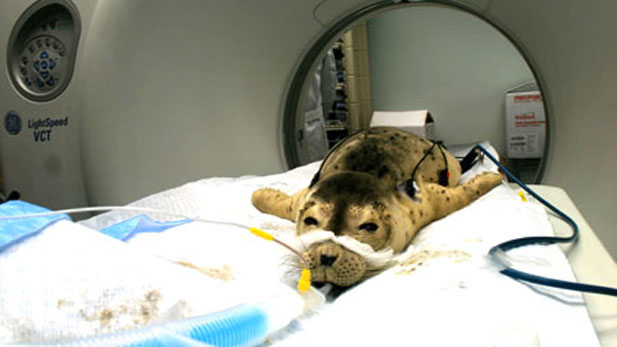
A harbor seal pup, named Xilia, sedated and prepared for a CAT scan to determine if she has a brain abnormality.
NOVA takes viewers inside this very special ER to witness the efforts of a renowned team of wildlife veterinarians as they fight to save sick and injured ocean mammals — and uncover the cause of the mysterious neurological illness plaguing animals like California sea lions and harbor seal pups. Not only are these patients bright, appealing and furry, they are also sending us an urgent message about the health of our oceans.
Renowned veterinarians Frances Gulland and Felicia Nutter direct medical treatment at the Marine Mammal Center, the foremost research hospital in the world that specializes in marine mammal veterinary care. It was Gulland who first linked the wrenching neurological symptoms afflicting marine mammals with domoic acid, a neurotoxin produced by algal blooms. Now, Gulland and Nutter work with a team of passionate volunteers to rescue sick and dying animals languishing on beaches. Some patients are malnourished pups separated from their mothers; others bear deep scars that are the result of being entangled in plastic trash floating in our oceans; all too many are victims of deadly domoic acid poisoning. Veterinarians at the center treat animals using a combination of traditional hands-on care, careful observation and the latest cutting-edge technology. The goal is to rehabilitate each animal and release it back into the wild.
The experts interviewed in the film believe that many of the maladies plaguing marine mammals reflect the declining health of our oceans and the profound effect that humans have on the environment. Hamilton describes the nearly 1,000 animals treated each year at the Marine Mammal Center as “canaries in the coal mine.” He adds, “‘Ocean Animal Emergency’ shows the link between human behavior, the deteriorating health of marine mammals and the destruction of their habitat.”
See previews and find out more at pbs.org
Watch it Tuesday, November 25th at 8:00 p.m. on PBS-HD

By submitting your comments, you hereby give AZPM the right to post your comments and potentially use them in any other form of media operated by this institution.